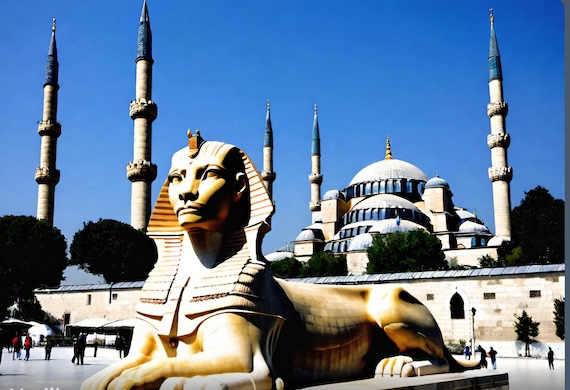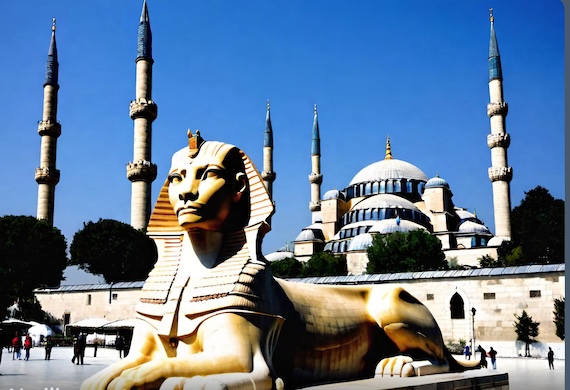How did Turkish President Recep Tayyip Erdoğan go from labeling Egyptian President Abdel Fattah al-Sisi a ‘murderer’ to referring to him as a brother?
Istanbul (Special to Informed Comment; Feature) – On Wednesday, Egyptian President Abdel Fattah al-Sisi made a historic visit to Turkey. This is the first time in 12 years that an Egyptian president has traveled to the country.
After years of tension, it appears that Cairo and Ankara are beginning to bury the hatchet. During Sisi’s visit, the two countries signed 18 memoranda of understanding on cooperation in various fields, including energy, defense, tourism, health, agriculture, finance, culture, education, and transport.
But why did Turkey and Egypt have a rift initially, and how did they manage to reconcile?
Timeline of Turkey-Egypt Rapprochement
After the 2011 revolution in Egypt, Erdoğan and the Justice and Development Party (AKP) government supported the rise of the Muslim Brotherhood and the election of Mohamed Morsi as Egypt’s president in 2012. Relations between Egypt and Turkey flourished since AKP had ideological affinities with the Muslim Brotherhood.
The relationship took a sharp downturn after Egypt’s military, led by General Abdel Fattah al-Sisi, ousted President Morsi in July 2013. Turkey strongly condemned the coup, with President Erdoğan labeling Sisi’s government as ‘illegitimate’ and refusing to recognize the new administration.
After the coup, supporters of Morsi began protesting and demanded his reinstatement. On August 14, 2013, Egyptian security forces intervened to disperse the demonstrators at Rabia al-Adawiya Square (named for a female Muslim saint) and Nahda Square in Cairo. The crackdown resulted in a high death toll; estimates vary, but Human Rights Watch reported that at least 817 to 1,000 people were killed.
This massacre became one of the deadliest instances of mass killing of demonstrators in modern history.
The Rabia massacre had a significant impact on Erdoğan and Turkey’s foreign policy. The name ‘Rabia,’ shares a root with the word for ‘four’ in Arabic, leading to the widespread adoption of the Rabia hand sign (four raised fingers with the thumb tucked in) as a symbol of support for the Muslim Brotherhood. Erdoğan incorporated the Rabia hand sign into his domestic political rhetoric.
After the military coup, Turkey became a safe haven for exiled members of the Muslim Brotherhood. Istanbul hosts several Muslim Brotherhood-linked media outlets, which broadcast in Arabic and are critical of governments that oppose the organization.
Erdoğan repeatedly called Sisi a “tyrant,” “murderer” and a “dictator.” Before the March 2019 Turkish local elections, Erdoğan even likened the Turkish opposition to Sisi: “Will we vote for (AKP candidate) Binali Yildirim or Sisi?” Erdoğan asked in an election rally.
Two years later, Turkey began repairing ties with Egypt, Saudi Arabia, and the UAE. In March 2021, Turkey and Egypt resumed diplomatic contacts at the level of the foreign ministry and the intelligence apparati.
As part of this foreign policy shift, Turkish authorities reportedly instructed three Muslim Brotherhood-affiliated TV channels operating from Istanbul — Watan TV, Al-Sharq TV, and Mekameleen TV — to reduce their criticism of the Egyptian government.
The following year, Sisi and Erdoğan shook hands at the 2022 FIFA World Cup reception in Doha, the capital of Qatar, and gradually, relations began to improve. Egypt and Turkey reappointed ambassadors for the first time in a decade in July 2023 and Erdoğan visited Cairo to meet with Sisi in February 2024.
Impact of the War in Gaza
Deutsche Welle suggested that the war in Gaza accelerated the rapprochement between Turkey and Egypt. Since the outbreak of the war, cooperation between the two states has become increasingly important.
While Turkey and Egypt agree on the Palestinian cause, Erdoğan’s sympathy for Hamas is not shared by Egypt.
Hamas was founded in 1987 as an offshoot of the Muslim Brotherhood, which Egypt designated a terrorist organization in 2013. Cairo also briefly classified Hamas as a terrorist organization in 2015, but this move was overturned by the courts on a technicality.
Nonetheless, Turkey and Egypt share a strong consensus regarding an independent Palestinian state based on 1967 borders. During their meeting, both Sisi and Erdoğan called for a ceasefire and humanitarian aid for Gaza.
They also called for an end to the ongoing escalation in the West Bank, where Israel had been conducting a military operation since August 28.
“Sphinx / Blue Mosque,” Digital, Dream, Dreamworld v3, 2024
Libya and Maritime Borders
In recent years, besides ideological differences, Egypt and Turkey have also had significant diplomatic tensions on regional issues.
Notably, Cairo and Ankara have backed opposing sides in the Libyan Civil War. Turkey has supported the UN-recognized Government of National Accord (GNA) in Tripoli. Meanwhile Egypt, along with the UAE and Russia, has supported the Libyan National Army (LNA) led by General Khalifa Haftar.
The two countries have also had disputes over the Eastern Mediterranean maritime borders.
In 2019, Turkey signed a maritime boundary agreement with the GNA in Libya. The deal extended Turkey’s claims over large areas of the Eastern Mediterranean, including waters claimed by Greece, Cyprus, and Egypt. In response to Turkey’s deal with the GNA, Egypt signed a maritime demarcation agreement with Greece in 2020.
After Sisi’s visit, the pro-government media in Turkey discussed the possibility of new maritime deals between Egypt and Turkey, suggesting that Turkey offers a better deal compared to Greece and Cyprus. Hürriyet claimed that Turkey’s reconciliation with Egypt has scared Athens.
What makes Sisi’s visit to Turkey so significant is the decade-long rift between the two countries. Erdoğan has been a vocal critic of Sisi, and this led to significant personal animosity between the two leaders.
As Turkish political scientist Emrah Gülsunar explains, under normal circumstances, “U-turns” in foreign policy occur among states since interests determine inter-state relations. However, Erdoğan’s approach is quite different. He tends to personalize foreign policy and make grand statements, this is why the shifts in Turkish foreign policy sometimes seem “tragicomic.”
It remains unclear how closely Turkey and Egypt will cooperate. Economic collaboration between these two countries—given their control over key trade routes like the Bosphorus, the Dardanelles, and the Suez Canal—could be mutually beneficial, especially as both face economic difficulties.
The Middle East has long been a center of geopolitical tensions and instability, and both Turkey and Egypt could benefit from enhanced cooperation on issues such as Gaza, Sudan, Libya, and Somalia. Despite significant challenges, the thaw in relations between Ankara and Cairo seems to signal a strategic recalibration in the region.
—-
Bonus video added by Informed Comment:
TRT World: “Türkiye and Egypt agree to work together on regional issues”




 © 2025 All Rights Reserved
© 2025 All Rights Reserved